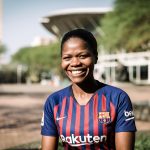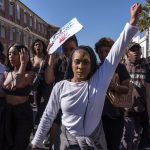The woman who ran
Caroline Peters survived being gang raped at the age of 15. Through running, she started to heal. But then she was ousted from the running club she founded in the area she was raped.
Author:
11 September 2019

It was July 1980. There was a park and three teenagers in their home neighbourhood of Bridgetown, Cape Town. Their parents had warned them to never walk through Nantes Park, but the youngsters scoffed. Caroline Peters was 15 years old. A group of men moved through the park and surrounded the trio. They stabbed Peters’ two friends. Then they raped her. She left Nantes Park and never set foot in it again – until she found running 30 years later.
The memory is still painful. On that day, Peters watched as her best friend was murdered. When volunteers from Rape Crisis offered to counsel her at home, her mother declined the help. Her parents decided they would resolve what happened in the family, but Peters was left on her own.
“At the time, I wanted to die,” she says.
For decades, the 54-year-old couldn’t look at Nantes Park. On her commute past the green patch, she would turn her head away. Then, she began to run.
“The first time I went back to Nantes Park was the day I started the Nantes Athletics Club,” Peters says.

The long run
In 2012, neighbours around Bridgetown watched as a woman with dark blonde curls jogged through the neighbourhood. As the months passed, her running quickened. They noticed she began to look healthy and younger.
Peters felt the transformation. For years, she had suffered from bipolar disorder. Running couldn’t cure her illness, but it soothed her mind into a safe quietude. She started out gently, eventually pushing her aching muscles to 2.5km in 30 minutes around the popular Rondebosch Common circular path near the University of Cape Town.
“Running kept me going for five years. I didn’t need admission. I was depressed at times but then I could put on my shoes and go run,” Peters says. “I would go to the Common crying, but I would run around the Common and get those good endorphins.”
Women around Bridgetown grew curious as they saw Peters run past their homes. Soon, they asked her to help them train.
Related article:
In 2014, in the year of her 50th birthday, Peters made history. She became the first woman to start a running club in Cape Town. Initially it was called Bridgetown Athletics Club, but then Peters changed the name to Nantes Athletic Club. In a working-class neighbourhood, where women had few support structures, Peters wanted to reclaim the space where she was raped. The interim executive committee to lead the club was women-only.
“This club was built for women’s development,” Peters explains.
At the time, running clubs in the Cape Flats were rare. Within the first year, Nantes grew to 400 members, and then to 600 and more. Soon, elections were held in which the executive became inclusive of male members of the club. But Peters never forgot that Nantes was about women. At the time, Western Province Athletics (WPA), the provincial athletics regulatory body, was dominated by a male-only leadership.
“I’m a trailblazer. I change narratives, and I fight against the patriarchal systems. You tell me I can’t be in the space. I will make my way into the space.”
But in 2019, Nantes imploded.

The fall of Nantes
In Bridgetown, residents proudly called themselves Bridgetownians. Their area has a rich anti-apartheid history born from the injustice of the regime’s Group Areas Act.
But in postapartheid South Africa, Bridgetown has been largely forgotten.
When Nantes started in January 2014, it began slowly. Members trickled in, and donned the club’s signature neon green T-shirt and black shorts. The green and black became instantaneously recognisable as the months passed. Neighbours would cheer groups of runners on weeknight training runs as they heard the soles of takkies on the tar.
Within five years, Nantes became one of the biggest running clubs in Cape Town and the pride of Bridgetown. It was a sports club, but also a community initiative that supported food drives and projects in the area. Peters was known to pay race entry fees for runners from her own pocket if they were short of cash. It was run like a neighbourhood project and sometimes funds were used to help residents.

But things have changed. Peters no longer stands on a chair at the beginning of training runs and cheers newbie runners on in her booming voice. The famous Nantes gees – the spirit of the club, with members who cheer at races – is no longer as bright.
Peters now stands accused of misappropriating R93 000 from the club and the Nantes interim executive has served a lawyer’s letter threatening court action if she does not repay the funds.
The accusation stems from charges laid by former Nantes treasurer Leon Hendricks, a businessman, against Peters at the WPA. Hendricks also alleged that R5 000 collected to help a house fire victim had not been delivered and that Peters had yet to repay a R2 000 loan to Nantes for the launch of the Bridgetown Park Run.
Peters in turn laid charges against Hendricks, alleging that funds were missing from an annual race hosted by Nantes in April 2018. The club, according to Hendricks, made a loss from the race despite a R50 000 sponsorship from beauty business Casuarina. She demanded to see the financial report from the race as club chairperson, but it was never given to her.
Related article:
Anthony Abrahams, a member of Nantes and the owner of Casuarina, has backed out of his business relationship with the club after “no tangible proof” was handed over to support the accusations against Peters. He says members of the interim executive have orchestrated a hostile takeover at the club.
“They didn’t do it when it was year one or year two or year three. They did it when there was structure. Everything was smooth until the first rand came in,” Abrahams says.
Hendricks has denied the allegations against him but said he has “no interest” in responding to any other questions.
As the tension escalated, Peters and Hendricks agreed to step down from their executive positions at Nantes until the turmoil was resolved and the next election could take place at the end of the year.
During a meeting with the WPA, shortly after the allegations were lodged, the executive was dissolved and replaced with an interim leadership. But some club members wrote emails to challenge the interim executive because no election had taken place. For the first time in the club’s history, a man chaired the club.
In June, the WPA presented its feedback from its investigation of the club and its members, but without any input from Peters. At the time of the investigation, Peters was hospitalised in Groote Schuur Hospital’s psychiatric ward after suffering a breakdown. She wrote to the WPA to say that she was not in a position to make representations, but the inquiry went ahead. Peters had both her psychiatrist and psychologist available to confirm her condition.
The WPA has chosen not to respond to questions about the investigation, stating that it is a “club dispute”.
Run out
According to members of the club who have chosen not to be named because they are still in Nantes, the WPA feedback did not delve into any of the allegations against Hendricks. Instead, a new allegation was brought against Peters, which dominated the feedback.
Peter Heeger, the investigating officer, said Peters is alleged to have misappropriated around R93 000 paid into the club’s bank account from a Discovery triathlon event in February. The information was taken from an unaudited spreadsheet. Heeger told members at the meeting that the spreadsheet had not been verified. The original allegations Hendricks made against Peters were never dealt with and the source of the new allegation was never revealed.
The club had helped organise the Discovery event, including providing marshalls from its membership who were paid from the Discovery funds. The club is demanding that Peters repay alleged cash withdrawals of R50 000 as well as money spent on payments and expenses of R43 000. The spreadsheet does not indicate if the money was used for club business or personal benefit. Peters has denied she misappropriated the funds.
Shortly after the WPA gave its feedback, a motion was passed at the meeting to vote Peters out of all fiduciary positions in the club. The majority voted Peters out, while a minority kept their hands down. The allegations against Hendricks were not discussed.
“How can you pass a motion to make a vote based on unverified information? The feedback in the allegations was one sided. It was everything against Caroline,” says one club member.
Related article:
Nantes subsequently sent a WhatsApp message to its members that said Hendricks had been “cleared of any misconduct” after providing “substantial evidence”. The evidence was not specified or explained to club members, some of whom remain suspicious because the financial report of the club’s 2018 annual race had not been released, despite numerous demands and an order by the WPA to do so.
While Abrahams has dropped his support of the club, other members have begun a protest in support of Peters by refusing to wear the club uniform at races until the discrepancies they see have been explained and corrected. Some members have been suspended from the club without disciplinary hearings for refusing to wear club colours at races.
“What happened to Caroline was not supposed to happen. WPA intervened in February, but the intervention made things worse because the problem with WPA is it’s a whole patriarchy thing. It’s a thing of men taking care of men,” one man involved in the protest at the club says.
Nantes acting chairperson Errol Poggenpoel said the club could not comment on the inquiry, because the dispute was ongoing.
“Our community is suffering because we used to have this proud, beautiful neon green, and we used to be so visible in Bridgetown. They hardly even train in Bridgetown,” says a member who lives in the area.

Going the distance
For months, Peters has suffered from depression in the aftermath of losing the club. But as a veteran and award-winning activist against gender-based violence, she has continued organising events and presenting searing talks about her experiences.
Peters’ work has grown to be nationally important. She has given input at Parliament on gender-based violence laws and has trained clinic staff on sensitivity towards survivors of sexual violence.
She began working at the Saartjie Baartman Centre for Women and Children in Manenberg when it was founded in 1999 and has been active in a number of organisations including Ilitha Labantu, which was the first women and children’s centre to be founded in a township, and the 1 000 Women Trust, an initiative to support women and children organisations.
She was 22 when she realised she could help other victims and survivors. It was seven years after her rape and she was at a Pick n Pay store when she saw a familiar face.
“I will never forget. I went to Mitchell’s Plain town centre and I come to Pick n Pay there, and here stands one of the rapists,” she says.
The men who had raped her had been given different sentences. The lowest was four years. She went to Rape Crisis and talked with a counseller about her trauma. The Rape Crisis volunteer programme caught her eye.
“Doing this work is about injustice. Because of my own experience, that shaped me into a gender activist,” she says.
Related article:
Her name is respected in feminist activist circles. But now within her own club and the community where her father introduced her to activism, she feels tarnished. Peters has written a six-page statement to the Western Cape Provincial Sport Confederation (WCPSC) requesting an opportunity to state her case, and demanding a public apology and the return of the club to its roots as a community organisation.
“I was treated as a leper, I was ostracised by the exco [executive committee], humiliated. The running fraternity is small, like any other sport code, and I had to dig deep and return to a race. Sports, which has given me so much pleasure before, became one of the most painful experiences for me. It was like being raped all over by Nantes,” Peters says in her letter.
She is scheduled to meet with the Department of Cultural Affairs and Sport on 11 September to have her case heard. As she tensely awaits the next chapter, Peters no longer feels that Nantes is hers. She was unable to run for months after being voted out of the club’s executive, but in mid-August she slowly returned to the road.
“The last time I ran was in February. And so, the last three weeks, I decided I can’t do this to me. Women look up to me. I don’t care about the men, but women look up to me,” she says.




